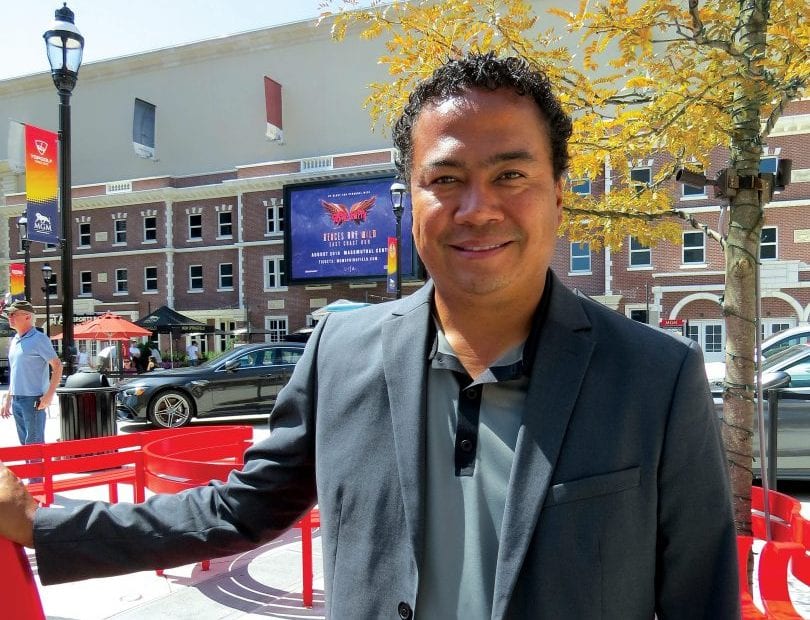
Learning Curves
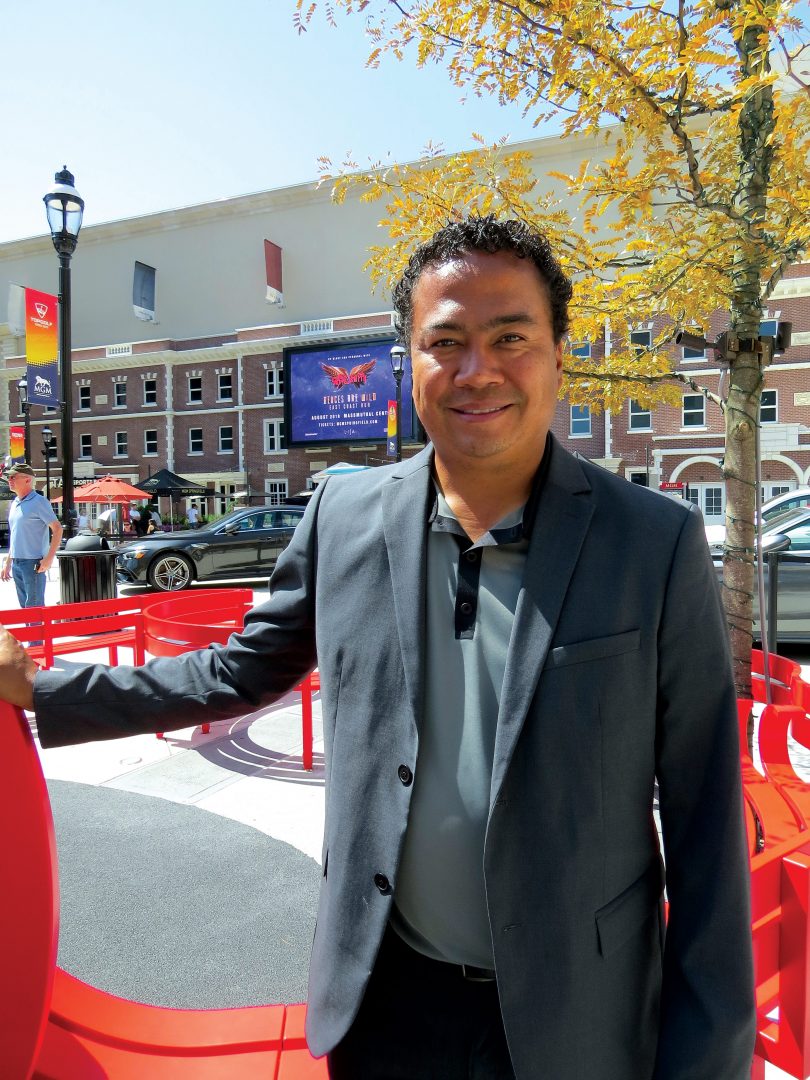
MGM Looks to Step Things Up in Year Two
It’s been nearly a full year since MGM Springfield opened its doors in Springfield’s South End. It’s been a year of learning — for both the casino’s team and the consuming public as well. As the headlines have announced, the casino has fallen well behind projections for gross gaming revenues (GGR), but in most all of the other ways to measure the success of the operation, it has not underperformed.
Mike Mathis started by stating what has become obvious — and also addressing the topic on the minds of most everyone in this region when it comes to MGM Springfield.
Gross gaming revenues (or GGR, an acronym that is increasingly becoming part of the local lexicon) are not what they were projected to be for the first year of operation, which will end August 23.
Those projections, made several years ago during the licensing process for the $960 million facility in Springfield’s South End, were for roughly $400 million this first year. Instead, the resort casino is on pace to record closer to $275 million, as the chart on page 8, which includes numbers through the end of July, makes clear.
“In the context of a three-year ramp, which is how we view it, we’re off to a slower ramp-up than we’d like,” Mathis, president and COO at MGM Springfield, admitted. “The gaming revenues are less than we hoped for, and the work is understanding where we are performing well and where we are underperforming.”
With that, Mathis hit upon ongoing work that began literally within days of the casino’s opening. And it continues in earnest today, with the expectation that those numbers can and will improve in year two.
Repeating what he said at the six-month mark for MGM Springfield, Mathis noted that new casinos generally go through a lengthy ramp-up period (three years is the timeframe he repeatedly mentioned) before fully hitting their stride. And that this ramping process involves some learning curves, especially when gaming is being introduced to a region, as is the case in Massachusetts.
And much was learned, said Mathis, referencing everything from Super Bowl watching habits — it became clear that most people would rather watch at home than go to the casino, although Mathis still hopes to change that — to the bands that people will come out to watch (it appears locals really like local groups rather than imports), to the casino games people like to play.
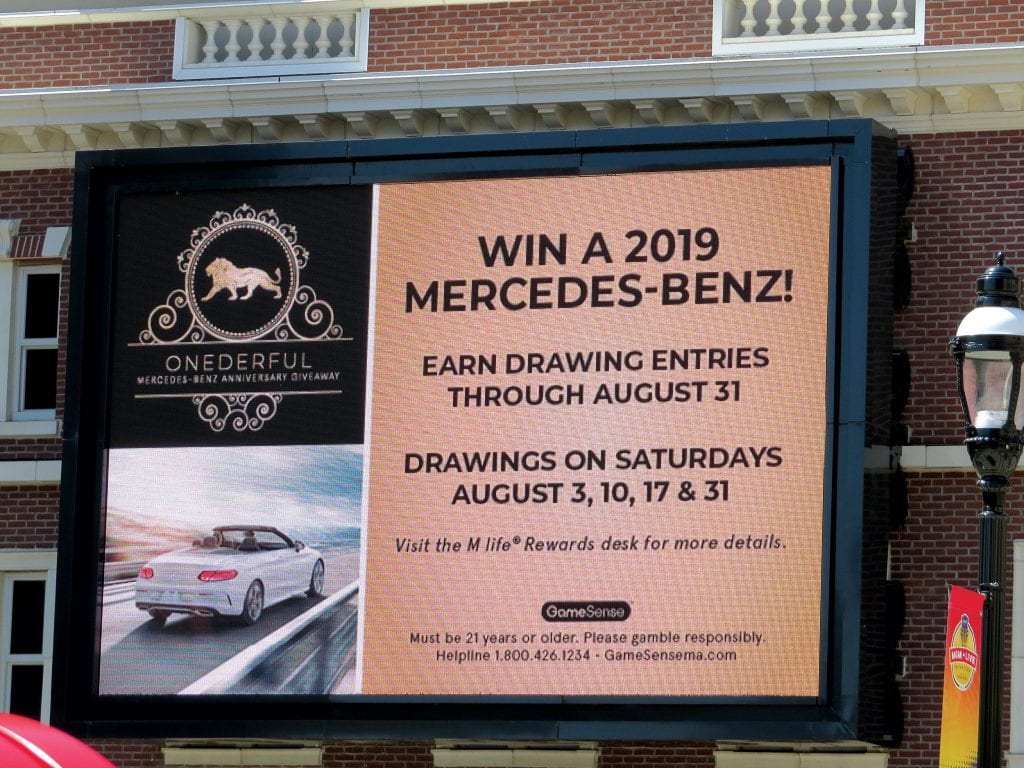
A promotion to give away a Mercedes Benz each week for a month is one of many strategic initiatives to drive visitation to MGM Springfield.
Looking ahead to year two, which will kick-off with four performances by Aerosmith and a host of other birthday-celebration events, Mathis said MGM Springfield will enter it with considerable acquired knowledge, as well as what appears to be some momentum.
Indeed, while June’s GGR numbers were the worst for any full month since the facility opened — Encore Boston opened that same month and probably had something to do with that performance — July’s numbers were better, said Mathis, and slots GGR has been generally higher over the past several months.
“There are many examples of facilities that have taken their first year to figure out what the customer is going to react to, what the competition is doing, and achieve real growth,” he said, adding that he firmly believes MGM Springfield will join that list.
He’s pinning those hopes on everything from changes and additions to the casino floor (more on those later) to the possible introduction of sports betting within the Commonwealth, an addition to the gaming landscape now being considered by the Legislature, to the ‘growing-the-pie’ impact of Encore Boston’s opening earlier this summer.
But while the focus has been on GGR, as it should be, said Mathis, there are many other means by which to measure success during MGM’s first year. And with most all of these, the casino has been on target.
These include overall visitation (more than 6 million by the end of the first year); non-gaming revenues (the restaurants and hotel, for example); impact locally in terms of providing a boost to other businesses, especially those in the broad realm of tourism and hospitality; bringing people to the region; boosting the business of meetings and conventions; and employment, especially with regard to hiring Springfield residents and promoting people through the ranks.
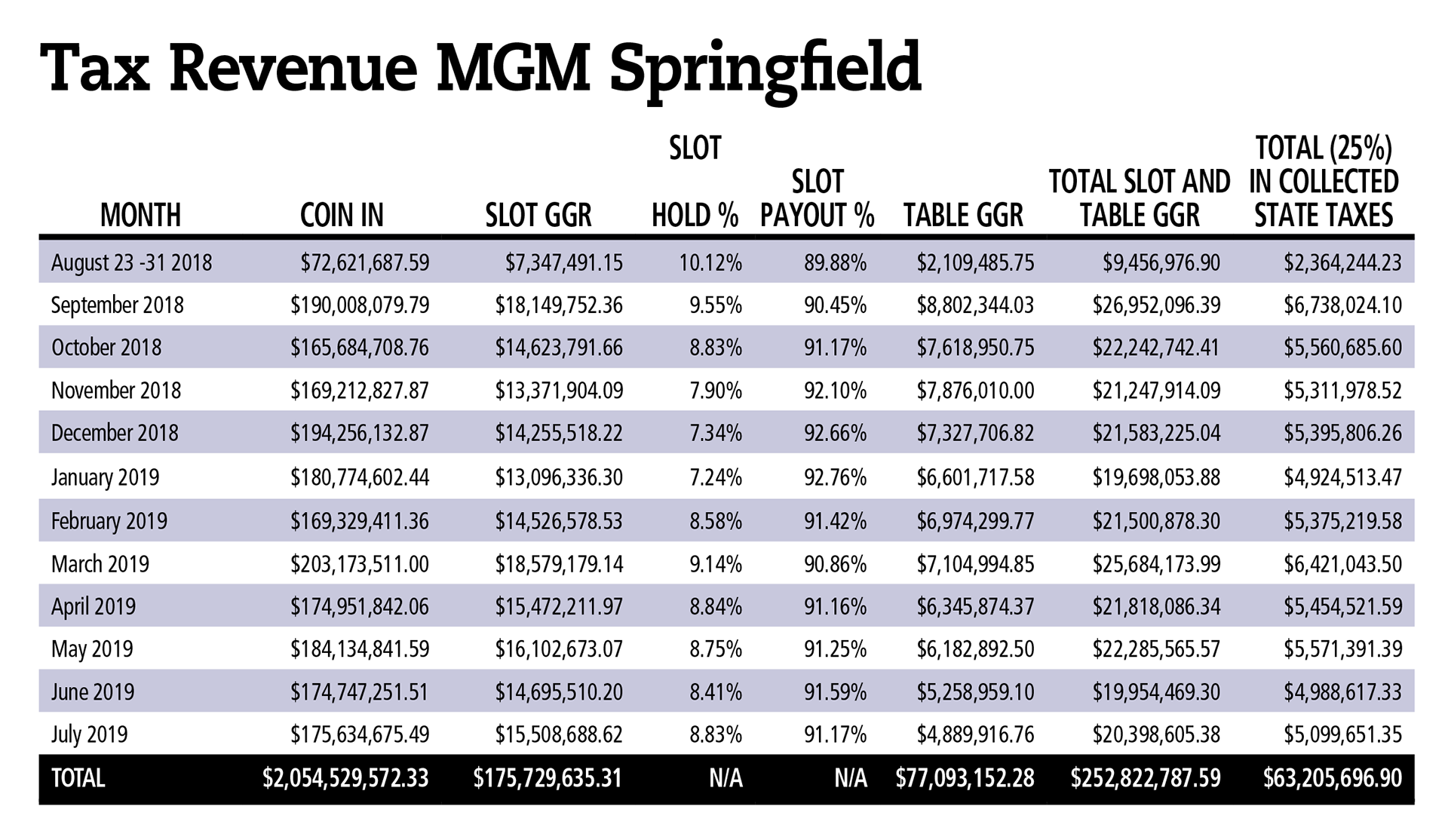
“We’re very excited about all the visitors and tourists and eyeballs we’ve brought to the downtown — I know I’ve met many customers who have said ‘this is my first time in Springfield,’ or that they’ve brought their families from other areas to the downtown to show it off,” Mathis told BusinessWest. “One of the emotions I have is a huge sense of pride in what we’ve done here; we’ve given the people of Springfield and Western Mass. a headquarters tourist destination that they can show off to friends and family.”
Rick Sullivan, president of the Western Mass. Economic Development Council, agreed. Using yardsticks as unscientific, but still effective, in his view, as waiting times for a table at restaurants in the downtown area, he said the Casino has brought more vibrancy to the central business district. Also, it has deeply broadened the region’s tourism portfolio, prompting not only greater visitation, but longer stays.
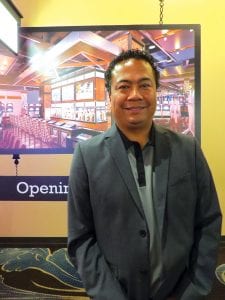
Mike Mathis says year one has been a learning experience on many levels for all those on the MGM team.
“The biggest impact MGM has had in the year it’s been open, and the biggest impact it will have going forward, is that you now have gaming and increasing entertainment opportunities to marry to the other tourist attractions that we can be more than just a one-day travel destination,” he said.
Raising the Stakes
Mathis calls it ‘keeping the floor fresh.’
That’s an industry phrase — one of many that are new to people in this region — and one that refers to the need to constantly change, or freshen, the casino floor to bring both more new business and more repeat customers, said Mathis.
“You can’t get complacent about continuing to earn customers’ loyalty in a highly competitive market,” he noted, adding that efforts to freshen the floor at MGM Springfield include the construction of a new bar just inside the Main Street entrance to the casino — what Mathis calls the ‘back corner,’ because most people enter from the parking garage side — as well as some new electronic table games, some ‘stadium gaming,’ described as a mix of table games and slot machines, and special promotions.
“There’s a whole new zone in that corner, where we’re trying to bring some energy to what would otherwise be the back of the building,” he explained. “We’re trying to drive more business to the back; it’s a heavy investment but part of our work to improve the product.”
These steps are part of the ongoing efforts to improve GGR, said Mathis, but also part of what would be considered normal ramp-up of a casino facility as it adjusts to customers’ wants and needs, and the ebb and flow of the competitive landscape.
“I’ve said this in the past, and our competitors have the same view, which is that you need three years to get to a normalized operation,” he said. “And we’re seeing that ourselves; there are holidays and certain events we think are going to be some of our busiest, and for whatever reason they’re quieter. And then we’ll have a random day in the middle of the week that exceeds a weekend day.
“It’s really about trying to understand the patterns and being nimble and reacting to the patterns,” he went on. “Obviously in a market like this, weather is a factor, and we’re learning what the impact of weather is — good and bad.”
Local sports teams are a factor as well, he said, adding that while they have huge followings, this support doesn’t necessarily extend to viewing at the casino, as was learned during the first Super Bowl of the casino era in Massachusetts.
“In this case, business was less than we would normally see in one of other operations — although it was still a really strong day,” he said, “I think there’s a tradition of going to a house party because of the success they’ve had; we’ve got to figure out how to make MGM Springfield the regional house party for the Super Bowl.
“We’ve got great relationships with all the franchises, and we have strategies on how to activate the space and make it fun and interesting, fun and familiar,” he went on. “It’s a fun challenge; it’s not what we expected, but it’s a good problem to have because there’s a huge opportunity there.”
This process of watching, listening, learning, and responding to trends that were not expected extends to every aspect of the operation, he said, including entertainment and that aforementioned affinity for local acts.
“There are some acts that we think that would traditionally do well as they route the country, that don’t perform as well here,” he explained, “And there were other acts where we were pleasantly surprised by the response; country is popular here, so we’re going to look at country a little more.
“Thematically, there are really great regional bands that have a following here that aren’t national and that we’ve had a lot of success with,” he went on, mentioning Trailer Trash, a ‘modern country band,’ as one example. “Anyone in a new market has to figure out what are those great local bands that drive big crowds, local crowds.”
GGReat Expectations
Of course, there are many other things to figure out as well, said Mathis, adding that the broad goal, obviously, is to bring more people to the casino and inspire them to do more (and spend more) while they’re there.
This explains the freshening of the floor, as well as the four Aerosmith shows (now nearly sold out) and a number of other initiatives designed to bring people to the casino — and bring them back repeatedly.
These are the simple forces that drive GGR, said Mathis, who returned to that ongoing work to identify areas where the casino is underperforming, and addressing them.
Overall, he said the broad assignment is to build loyalty, not merely a visit or two to the resort and its casino floor.
“Part of the first year is gaining new visitors and customers who are seeing it for the first time and building loyalty,” he explained. “And in this market, because of the existence of some pretty strong competitors, there’s already strong loyalty and traditions and gaming habits that, quite frankly, we have to disrupt, and that takes some time.”
Meanwhile, there are some lingering patterns when it comes to where customers are coming from — or not coming from — that still need to be addressed.
Indeed, while MGM Springfield is overperforming, in Mathis’s view, when it comes to drawing customers from along the I-91 corridor, “north-south,” as he put it, things are different when it comes to east-west flow.
“It’s been a challenge to get folks to go west within the Commonwealth and give the facility a chance,” said Mathis adding that bookings like Aerosmith are designed to address that specific problem, and he believes there have been some inroads.
As for those efforts to disrupt current gaming patterns and loyalty with other casinos, Mathis noted that there are several arrows in that quiver, including everything from some new games to be introduced in the coming weeks, to a new promotion that involves giving away a Mercedes each week for several weeks, to a recently concluded program called MGM Millions, a lottery-like game that enabled players to win a wide variety of prizes including bonuses and loyalty privileges.
“That was very successful,” said Mathis, “and what we learned is that people like the lottery, and they’d rather have a smaller chance of winning a larger giveaway than a higher chance at smaller gifts — and that’s part of the learning curve.”
It also includes the addition of Symphony Hall to MGM’s portfolio of performance venues (the casino recently assumed management of that facility), which enables the team to book acts such as Steve Martin & Martin Short, coming Sept. 12, Boyz II Men (Sept. 22), and Smokey Robinson (Oct. 18).
“It’s another great venue that fills a niche we didn’t have previously,” he said, noting the hall’s 2,500 seating capacity. “That’s something in the tool shed we didn’t have our first year, especially since we can program into it, so we’re excited.”
He’s excited also by the prospects of sports betting.
“We’ve seen in our other markets that it can provide as much as a 10% lift to the overall business, not just the sports-betting component,” he said. “People will tend to stay longer, they’ll eat in the restaurants, they’ll place a bet, and spend some time on the casino floor on the machines or on the tables. So it’s an important initiative for us, especially in a market like Springfield and New England where people are passionate about their sports; we think it’s a manner of when, not if, this will happen.”
And, moving forward, Mathis said that while Encore Boston might impact MGM negatively in some ways, overall it will grow the pie when it comes to gaming, as evidenced, he believes, by the Springfield casino’s improved numbers for July.
“That demonstrates what we’ve always said — that there’s an ability to grow this market; there’s different customers for different experiences,” he said. “I like to think that the people in Boston will grow the market.”
Beyond the Floor
While much of the focus has been on the casino floor and GGR, Mathis said there are many other facets to this business, and he’s pleased with, and somewhat surprised by, the performance of some of these operations.
“I’m pleasantly surprised by how well-received our non-gaming amenities have been,” Mathis told BusinessWest. “The hotel is far above our projected occupancy rates, and the rate we’ve been able to charge is above what we project as well.”
He said the hotel has been generating a wide mix of business, from casino guests, to families visiting the area, to convention and meeting groups.
“We’ve done entire hotel blocks for different corporate groups that have come in and let us host their annual meetings or their incentive meetings for top salespeople,” he noted. “On every given day there are different types of customers in the hotel. We’ve been really pleasantly surprised by the amount of cash business we’re driving, the occupancy; that’s translating into the restaurants, exceeding our expectations on the amount of business overall.”
So much so that the MGM team is looking at perhaps adding more offerings, on top of the Wahlburger’s restaurant due to open next spring according to the latest estimates (groundbreaking will be within the next few weeks).
Meanwhile, business at the casino’s many bars has also exceeded expectations.
“We’ve also been pleasantly surprised by the amount of night life and bar business we’ve been doing,” said Mathis. “New Englanders enjoy their local IPAs and enjoy our nightlife lounges, so we’ve built some extra bars, such as the plaza bar to support our outdoor entertainment, and it’s been very successful.”
While generally pleased with what’s been happening within the casino complex itself, Mathis said the first year has shown that MGM Springfield’s impact extends beyond those four walls — and also that block in the South End.
As an example he points to the Red Rose restaurant abutting the property. Already a mainstay and hugely popular eatery, the restaurant has clearly received a tremendous boost from the casino.
“I was talking to the owner, Tony Caputo, on a Friday night recently,” Mathis recalled. “And he talked about business being up considerably since our opening, and how it actually started before we opened, during the construction process.
“Anecdotally, I’ve heard that many of the restaurants are up 20%, based on the overflow visitation we’re bringing — there’s more people than we can lodge and more people than we can feed,” he went on. “That was part of the strategy intentionally, and it’s bearing out.”
Rick Sullivan agreed.
“There’s more activity downtown now, there’s more people walking around,” he told BusinessWest. “It’s not like you can’t get a seat at a lunch place, but it is busier and that’s good; I never mind waiting a little longer to get a table — that’s a good thing.”
An even better thing, he went on, is MGM’s apparent ability to ‘extend the stay,’ as those in the tourism business say. Elaborating, he said there is some anecdotal evidence building that the addition of the casino is prompting more people to look to the region as something more than a day trip.
“People are looking to match a day at the casino and the Seuss Museum, or the Basketball Hall of Fame, or Six Flags, or the Big E,” he said. “People will do the Big E for the day and the casino for a day; we’re starting to see that.”
Likewise, he and others are seeing people visiting the region for special events and happenings make a point of also visiting the casino and, therefore, downtown Springfield.
He said he witnessed this first-hand when it came to teams that came from out of town for a sled hockey tournament at Amelia Park ice rink in Westfield, and he expects the same for the Babe Ruth World Series, also to take place in that city.
“It’s a place to take people,” he said, adding that as more of this happens, the overall impact of the casino will only grow.
Toward Year Two
As he talked about what’s coming up for the casino’s first birthday party — Aerosmith, a huge cake, the Patriots cheerleaders, and more, Mathis flashed back 350 days or so to when he and Springfield Mayor Domenic Sarno rode down Main Street in a Rolls Royce manufactured in Springfield during a parade that preceded the formal ribbon cutting.
The year that followed that triumphant moment has been one of intrigue and learning, for many constituencies, and one where expectations have mostly been met.
In year two, the focus will be on maintaining the current course, but also achieving progress with those expectations that haven’t been met. u
George O’Brien can be reached at [email protected]






